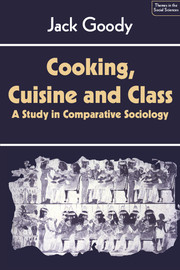Book contents
- Frontmatter
- Contents
- List of illustrations
- Preface
- Dedication
- 1 Intentions and remarks
- 2 State of play
- 3 Production and consumption among the LoDagaa and Gonja of northern Ghana
- 4 The high and the low: culinary culture in Asia and Europe
- 5 Industrial food: towards the development of a world cuisine
- 6 The impact of the world system
- 7 Cooking and the domestic economy
- Appendix: Terms, operations and cognition
- Notes to the text
- Bibliography
- Index
- BY THE SAME AUTHOR
2 - State of play
Published online by Cambridge University Press: 05 June 2012
- Frontmatter
- Contents
- List of illustrations
- Preface
- Dedication
- 1 Intentions and remarks
- 2 State of play
- 3 Production and consumption among the LoDagaa and Gonja of northern Ghana
- 4 The high and the low: culinary culture in Asia and Europe
- 5 Industrial food: towards the development of a world cuisine
- 6 The impact of the world system
- 7 Cooking and the domestic economy
- Appendix: Terms, operations and cognition
- Notes to the text
- Bibliography
- Index
- BY THE SAME AUTHOR
Summary
The intention of this chapter is not to provide a synopsis of anthropological thought but to sketch out the kinds of attention that anthropologists have given to the study of ‘food’ over the years, partly as a guide to the general reader, partly to spell out the background to my own interest. After looking briefly at the contributions of nineteenth-century scholars I comment upon work done in the functionalist and structural-functional traditions of British anthropology. But it is the work of the structuralists, and particularly of Lévi-Strauss, that demands more detailed attention, since notions of the ‘cooked’ and the ‘raw’ play such a central part in his analysis; more generally the domain of cooking itself has been used to demonstrate the validity of an approach modelled on linguistic binarism.
THE PRECURSORS
In the nineteenth century anthropological interest in food centred largely upon questions of taboo, totemism, sacrifice and communion, that is, essentially on religious aspects of the process of consumption. Typical of this concern was the work of that famous Cambridge figure. Sir James Frazer (1854–1941), who was induced to write articles on taboo and totemism for the ninth edition of Encyclopaedia Britannica when its distinguished editor, Robertson Smith, joined him at Trinity High Table after his career in Scotland had been cut short by the appearance of his notorious article under the heading ‘Bible’.
- Type
- Chapter
- Information
- Cooking, Cuisine and ClassA Study in Comparative Sociology, pp. 10 - 39Publisher: Cambridge University PressPrint publication year: 1982

